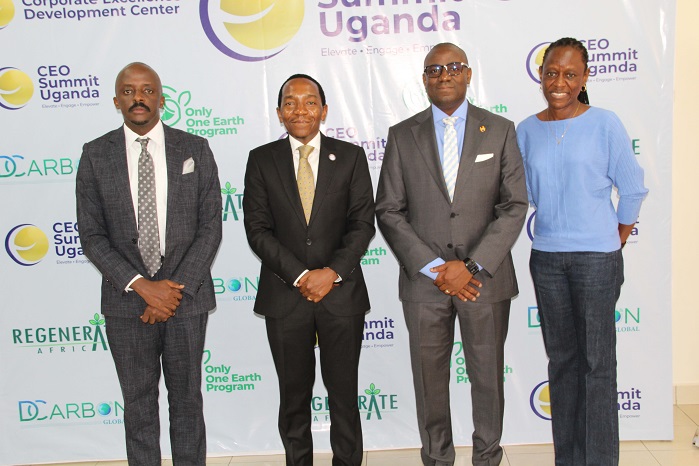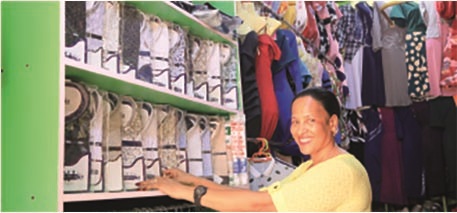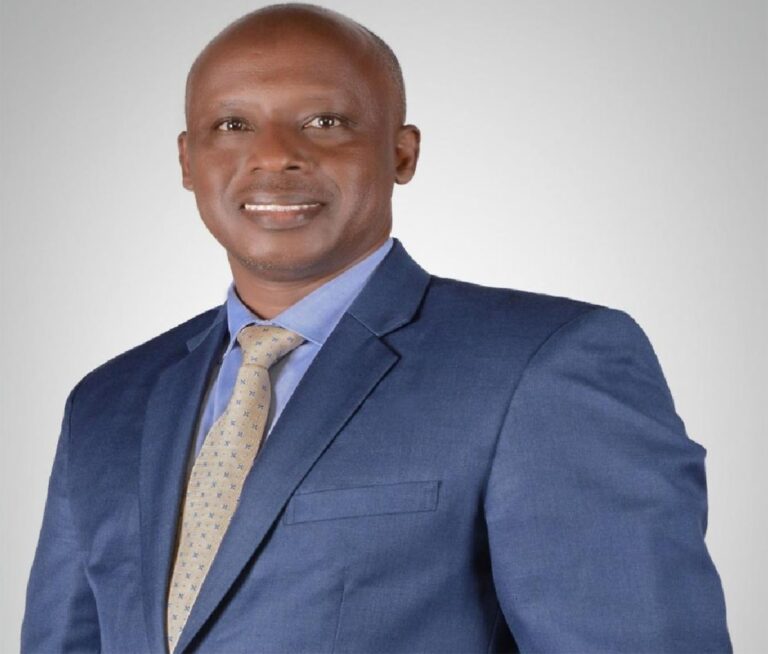
The Country Team Leader of CEO Summit Uganda Stephen Mukasa (2nd L) Head Brand Marketing and Communication at Prudential Uganda Peter Mugarura (L) Chief Finance Officer at Cipla Quality Chemical Industries Fredrick K
The Country Team Leader of CEO Summit Uganda Stephen Mukasa (2nd L) Head Brand Marketing and Communication at Prudential Uganda Peter Mugarura (L) Chief Finance Officer at Cipla Quality Chemical Industries Fredrick K
HABARI DAILY I Kampala, Uganda I Ugandan Chief Executive Officers (CEOs) have launched the “Only One Earth Campaign,” an inclusive economic growth process that can lead to low emissions and environment preservation.
Launched under their umbrella body, the CEO Summit, they said they identify themselves with Uganda’s climate mitigation targets, to be achieved by 2030.
Some of these targets include having 152,622 hectares under irrigation, ensuring access to electricity for 75% of the population, and having climate action plans in 50% of local governments.
Stephen Mukasa, the Country Team Leader of CEO Summit Uganda the country also committed to restoring 2.5 million hectares of forest landscape and raising awareness of climate change among 11 million people by 2030.
“In March 2023, Uganda revised the Nationally Determined Contribution (NDC), a plan championed by the United Nations Development Programme (UNDP) to increase its ambition of reducing greenhouse gas (GHG) emissions from 22% to 24.7% as well as deal with the effects of climate change and fulfill the aspirations of the Paris Agreement,” he stated.
He said because of laxity in combating the effects of climate change, Uganda has witnessed heavy rains that have caused floods in the Central Business District areas like Kampala, and landslides in Eastern Uganda among other places.
Mukasa further pointed out that there is an urgency to curb these negative effects, “because our planet’s existence is profoundly linked to the well-being of all living things, including ourselves.”
Charles Kabiswa, the Regenerate Africa executive director, said the Only One Earth Program perfectly aligns with their mission to accelerate Africa’s transition to a regenerative economy.
“This would be done through the adoption of regenerative human development approaches where people, businesses, and our planet thrive in harmony,” he said, adding that by building multi-sectoral strategic partnerships, Uganda as a country can advocate for integrated regenerative techniques, innovations, and solutions across agriculture and food systems.
“Through that process, we can introduce drastic measures to adopt climate and renewable energy solutions, public health and gender, forests and water resources, and business solutions that drive change towards a regenerative future,” he said.
The program will focus on three core areas which include understanding sustainability, Sustainable leadership, and Sustainable business practices.
The CEO’s pointed out that Uganda was one of the countries grappling with the challenges of energy poverty.
They added that by embracing sustainability and environmental stewardship, Ugandans can not only safeguard the health of our planet but also create a more resilient and prosperous future for all.
“We therefore urge every business leader and those in positions of influence to seize this opportunity by onboarding their organizations through the Only One Earth Program,” they pointed out, adding that through this strategy, they can join efforts toward creating a difference, not just for the sake of our businesses, but for the planet and all its inhabitants.
Speaking about energy poverty, they stated that there is a severe lack of access to modern energy services including electricity and clean cooking fuels, with access to electricity in rural areas reported at 35% while in urban areas this was 72% in 2021.
According to the International Energy Agency, in the past 20 years, Uganda has lost over a million hectares of tree cover—nearly a third of the country’s total, due to deforestation, caused by encroachment on forests for firewood.
The Only One Earth Campaign aligns with the United Nations Sustainable Development Goals to Protect, Restore, and Promote sustainable use of terrestrial ecosystems, highlighting the need to reset the balance with nature through transformative changes.




